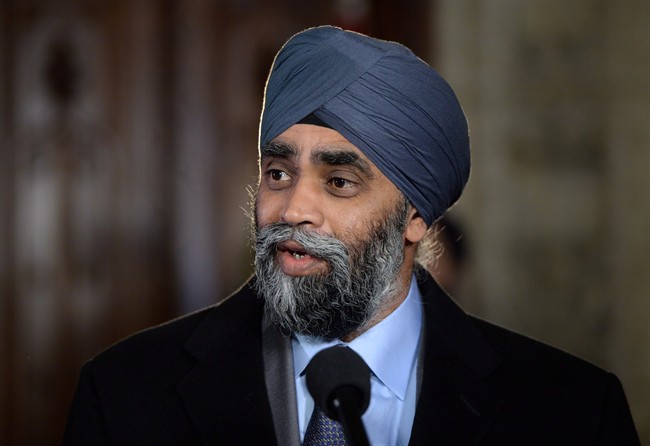Defence Minister Harjit Sajjan would not commit to holding a vote in the House of Commons on Canada’s next peacekeeping mission on Thursday, but confirmed that Canadian troops could be put in harm’s way.

Sajjan addressed reporters on a conference call from London, where he is attending the UN Peacekeeping Defence Ministerial. The minister was asked repeatedly whether the eventual mission would be voted on by MPs from all parties in the House, but he did not answer the question directly.
“We have communicated information with Canadians right from the get-go” when it comes to Canada renewing its role as a peacekeeping nation, Sajjan said.
He pointed out that the Liberal government campaigned on that pledge, and that it is contained within his own mandate letter from Prime Minister Justin Trudeau.
“It should not come as a surprise to anyone, especially the Opposition, that our government wanted to be involved in peacekeeping operations.”
WATCH: Trudeau remains uncertain what renewed peacekeeping commitments could look like

Last week, the government announced it would formally commit nearly half a billion dollars and up to 600 soldiers toward United Nations peacekeeping operations, but offered few details on the shape and scope of the mission.
READ MORE: Canada to send more peacekeepers overseas, here’s where they could go
The opposition Conservatives have since slammed the government for a lack of transparency on the issue. Defence critic James Bezan has also accused the Liberals of re-engaging with peacekeeping simply to fulfill Prime Minister Justin Trudeau’s desire to win a seat on the UN Security Council.
“In terms of exactly where (in the world) we’re going to go, I have not put a timeline on that,” Sajjan said Thursday.
“We want to make sure that we have all the necessary facts in place … I’d like to move on this preferably by the end of the year but I don’t want a timeline to determine what type of decision we’re going to make.”
Peacekeeping in 2016 is “not the peacekeeping of the past,” the minister added, and radical groups further complicate an already complex situation in many countries.
READ MORE: Reality check: Canada commits 600 soldiers, $450M to UN peacekeeping missions, but do they work?
Asked if Canadians would end up on the front lines of conflicts involving such groups, Sajjan acknowledged that it may be necessary in order to protect civilians from harm.
“Our troops may be required to use force at various levels, up to and including deadly force if necessary … Protection of civilians must be at the forefront of any mandate.”
Any future mission will require established rules of engagement, he said, noting that some countries have failed to “interpret” the mandate to protect civilians properly.
- Train goes up in flames while rolling through London, Ont. Here’s what we know
- Budget 2024 failed to spark ‘political reboot’ for Liberals, polling suggests
- Wrong remains sent to ‘exhausted’ Canadian family after death on Cuba vacation
- Peel police chief met Sri Lankan officer a court says ‘participated’ in torture




Comments